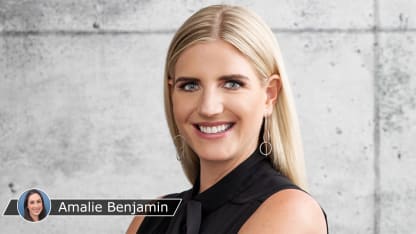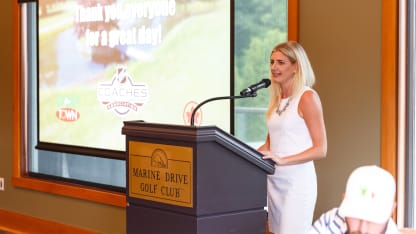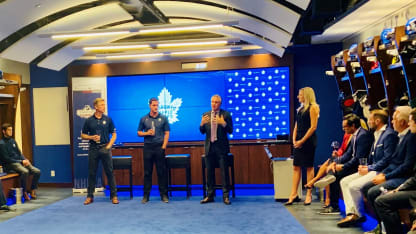The NHL, NHL Players' Association and the entire hockey community will be celebrating Gender Equality Month in March. Throughout the month, NHL.com will feature those shaping hockey today and moving the game forward for the next generation.
Artkin aiding women, minorities as president of NHL Coaches' Association
Has helped expand training, networking opportunities to 'get everyone engaged'

Like most little girls in Canada, Lindsay Artkin was put in skates and into lessons at a young age by her parents, indoctrinated into the national pastime. She had no great affinity for it, no deep love of skating or hockey or even the Toronto Maple Leafs, an unavoidable piece of growing up in Toronto.
Her love found its home elsewhere, in spreadsheets and data, in math and marketing and storytelling.
And so it made sense that Artkin moved into the world of investments, of finance, the world of money. Moved into, and up, climbing the ranks, reaching the vice president level of a billion-dollar firm before she hit 30.
"But after a decade, I literally opened my eyes one day and was like, this is not my passion," Artkin said. "I cannot spend the next 30 years of my life doing this."
Which is when hockey found her.
Artkin has spent the past six years working for the NHL Coaches' Association, the past three as its president, rebuilding the association and helping to take it from a side gig run by NHL coaches to a booming business, a place where she and executive director Mike Hirshfeld can directly impact the lives of this generation of coaches, and the next.
The job has fit her perfectly as she has made a name and a reputation that has some predicting even bigger things for her eventually. She has been able to formulate programs that are helping female coaches; coaches who are Black, Indigenous and people of color (BIPOC); and current NHL coaches as she reimagines what the future of coaching could look like.
There is still data for the self-proclaimed "math nerd." There are still spreadsheets. But now, there are also people to help, with health care and green cards, sponsorships and benefits.
"It's been amazing to watch what she's been able to do," said Washington Capitals coach Peter Laviolette, who is on the NHLCA executive board. "She's really, truly earned the respect of everybody in our association. It's her work ethic. It's her energy that she puts into it. It's her knowledge and how smart she is. And I think first and foremost, she's just a terrific person."
The fit was flawless.
"It very quickly became clear to me that the NHLCA and the NHL and hockey was what my passion was," Artkin said. "I love watching hockey and I love that side of it, [but] I loved the opportunity to help a coach. And so that really is what drove me and what drives me."
\\\\
But, at first, it was scary.
"You're like, well, what is my passion?" she said. "Because it's hard to make a change when you've had success and you thought you were going to be going down a certain path forever. And then, life kind of takes care of you."
She left Toronto, headed to California to work in tech and education, and set up a consulting business to try out different industries. That was when Hirshfeld, a former colleague in investments in Toronto, got in touch. He had become executive director of the NHLCA and wanted to bring Artkin in to consult.

That was in the fall of 2016. Less than three years later, in January 2019, Artkin was named its president.
When Hirshfeld and Artkin joined the NHLCA, it had been run by coaches, from George Kingston to Jon Cooper to Mike Babcock to Claude Julien. They had determined that they needed help, that they needed to look outside their fraternity for a fresh perspective.
"When we set out to revitalize the association, there were a couple of objectives that were really important," Hirshfeld said. "One was to give coaches a stronger voice in the future of the League and in the future of the game of hockey. One was to make sure that they were as protected as they could be, whether that was salary, whether that was pension, whether that was health benefits.
"We wanted to build a strong association with a strong foundation and get everyone engaged. … It's come a long way in five years."
The Association went from having 44 percent participation by its coaches to 100 percent. It has been able to cater to the needs of the coaches and their families, to expand education and sponsorship opportunities, to negotiate with the NHL for things like the use of the NHL shield in the NHLCA logo.
"I was just blown away by how professional the organization had become," said former Edmonton Oilers and Buffalo Sabres coach Ralph Krueger, who went nearly six years between the two jobs. "It had structure. It had a plan. It had goals. It had everything you need, and it had really clear values.
"What I love about what Lindsay especially has brought to the table is just the compassion that the organization shows. Everybody knows the head coach's names, but very few people understand the importance of the work that goes on behind the scenes in the assistant coaches, in the video coaches, in the minor leagues. With Lindsay coming into play, there was a bigger awareness of -- didn't matter who it was -- whether you were a head coach or a video coach, her and Mike and the organization took care of everybody the same."
It went from a cutthroat business to one where coaches are in line to contact others who have been fired, where coaches have formed a support network, where there is consideration instead of ruthlessness. Where those inside are willing to help those outside.
And that's where she's made the biggest difference, perhaps.
\\\\
There had been so many rooms where Artkin had looked up and seen exclusively men, where she was one of just a few, scattered women, if not the only woman. So when she saw the 500 male faces (and four or five women) staring back at her at the association's coaching clinic at the 2019 NHL Draft in Vancouver, a lightbulb went on.
"That was really the hit-over-the-head moment for me where I was like, OK, there really is no diversity at all," she said. "And we need to put an effort toward that."
It's why in 2020 Artkin started the Female Coaches Development Program, dedicated to providing training, support, education and networking to a group of women in order to further their careers in hockey, followed that summer by the BIPOC Coaches Program.
"The main objective of the association is to develop that next generation of NHL coach," Laviolette said. "Obviously, women need to be a part of that, visible minorities and other underrepresented groups need to be a part of that. There's so much knowledge and expertise within our constituents, within our NHL coaches, that we want to share that with the hockey community, no matter your gender, race, ethnicity, whatever it may be."
According to Artkin, there are about 111 women out of almost 2,000 coaches between the NHL, the American Hockey League, the NCAA and the developmental leagues (the ECHL, United States Hockey League and Canadian Hockey League). It's not nearly enough.
"A very, very small percentage," Artkin said. "So that's where we know we're starting from. I've set very ambitious goals for what I would like to see the [Female Coaches Program] be able to deliver."
In the short term, 1-3 years, Artkin wants to see the first female full-time assistant or coach in the USHL, ECHL or CHL, not just video or skating and skills coaches. She wants to see a 10 percent jump in jobs for female coaches.
"Longer term, three-plus years, there needs to be a female coach behind an NHL bench," she said.
Artkin has been the driving force behind both the Female Coaches Program and the BIPOC Coaches Program, their heart and soul and brains and energetic center.
"It's completely all of her work," Hirshfeld said. "She's been the mastermind behind it. She's the one who's driven all of the programs, all of the scheduling, everything that we do. She's the one who's engaged our NHL coaches to participate. And so it's her baby, 100 percent."
She wants to challenge the idea that women can't be in these positions, that they can't coach men. Artkin knows there are excuses, many of them, and she wants to eliminate all of them. And, more than that, she wants to provide dynamic candidates at all levels, coaching both boys and girls, women and men, from youth hockey on up to the NHL.

And, in that, she is a tremendous ally.
"It's coming from the NHLCA and it's coming from a woman in the NHLCA," Lee-J Mirasolo, the associate head coach of the Harvard University women's hockey team, said last year. "[Lindsay] is amazing and deserves so much credit. I can't even express in words how grateful I am to her. She has no idea, but I'm sure in 10 years or five years, even, from now, we'll look back at this and be like, holy smokes, Lindsay, look what you've accomplished."
\\\\
It is not always easy to get an NHL coach to put down the video and pick up the phone. But Artkin makes it seem simple, her ability to summon the sport's best in a flash a testament to how important she has become for them.
"She's a gem," said Hockey Hall of Fame coach Scotty Bowman, who won the Stanley Cup nine times a coach and five times as an executive. "I'm sure this is only a starting point for her."
And that's the question that, as Bowman said, no one wants to think about because she's so valuable where she is. Women are reaching new heights in hockey, as evidenced by the Vancouver Canucks hiring Emilie Castonguay and Cammi Granato as assistant general managers this season, making them the second and third women to hold the job in NHL history, after Angela Gorgone with the Mighty Ducks of Anaheim in the 1996-97 season. Which leaves some feeling that Artkin could be destined for even bigger things.
"Honestly, she can do whatever she wants," Hirshfeld said. "I think she's that talented, whether it's in hockey or whether it's outside of hockey. But I think this program still has a ton of room for growth."
Which is to say that he's not entirely ready for her to go. She's not sure yet, either.
"I feel lucky that I've uncovered that hockey is where my passion is," Artkin said. "And I'd be silly not to explore different avenues or different areas of it. That said, there's still so much runway ahead for what I want to accomplish here with the NHLCA that I'm just honestly so excited about the next 3-to-5 years."
The coaches she works with praise her empathy, her compassion, her communication. They see her as a "natural-born leader," as Krueger put it. They laud her energy and her passion. They see her as a team president, a future executive in the NHL, as a culture-driver and a person who can get things done.
"I think that her knowledge of the League and the knowledge of the game and her personal strength, as somebody who can connect with people, sets her up for a really bright future," Laviolette said. "Somebody would be really fortunate and lucky to have her in their organization. And I say that because we love having her here."
She loves it too. She has found a home, one she never could have imagined a decade ago, or when she was lacing up those figure skates as a kid.
"Honestly, I feel so lucky," Artkin said. "I pinch myself that I wake up and this is what I do.
"I'm paid to do this? This is insane."

















